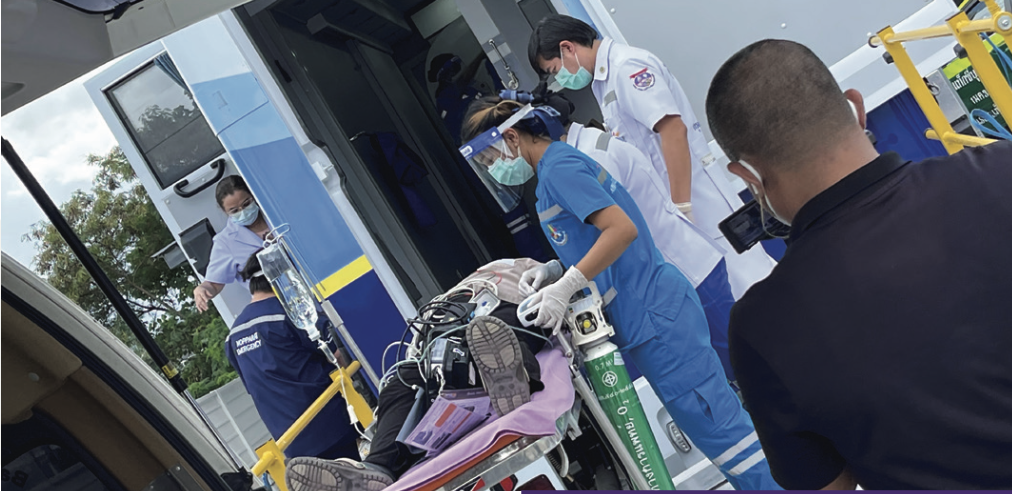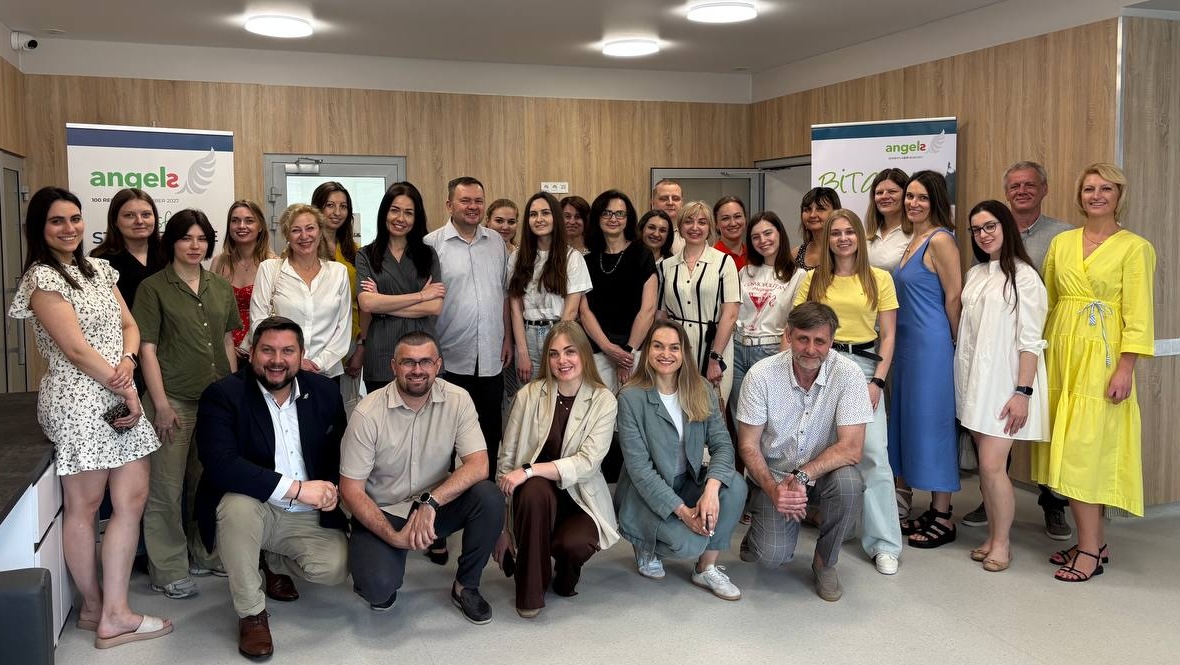การใช้หน่วยโรคหลอดเลือดสมองเคลื่อนที่ในประเทศไทยมีศักยภาพในการช่วยชีวิตและลดความพิการของผู้รอดชีวิตจากโรคหลอดเลือดสมอง แบบฝึกหัดการจําลองสถานการณ์กับทีม Angels Thailand ทดสอบ

เวลามีความสําคัญสูงสุดในการรักษาผู้ป่วยโรคหลอดเลือดสมองชนิดสมองขาดเลือดเฉียบพลัน ยิ่งผู้ป่วยได้รับการรักษาได้เร็วเท่าใด ก็ยิ่งมีแนวโน้มมากขึ้นที่จะรอดชีวิตจากเหตุการณ์ดังกล่าวและกลับมามีชีวิตโดยมีความพิการน้อยที่สุดเท่านั้น การจัดการเวลาหมายถึง การช่วยชีวิตให้เร็วขึ้น แต่การจราจรและภูมิประเทศเป็นอุปสรรคที่สําคัญในการลดเวลาเดินทางและระยะห่างระหว่างการเริ่มต้นและการรักษา
หน่วยโรคหลอดเลือดสมองเคลื่อนที่เป็นวิธีใหม่ในการเข้าถึงการดูแลผู้ป่วยที่เร็วขึ้น พวกเขามีศักยภาพในการลดเวลาที่ใช้ในการเข้าถึงการรักษาสําหรับผู้ป่วยโรคหลอดเลือดสมองลงอย่างมีนัยสําคัญ การเข้าถึงผู้ป่วยได้เร็วขึ้น และการวินิจฉัยและการรักษาสามารถจัดการได้อย่างทันท่วงทีในระหว่างการเดินทางไปยังโรงพยาบาล เพิ่มความเป็นไปได้ในการรอดชีวิตและคุณภาพชีวิต
หน่วยโรคหลอดเลือดสมองเคลื่อนที่ได้ดําเนินการแล้วในห้าโซนในประเทศไทย เพื่อสนับสนุนการรักษาผู้ป่วยโรคหลอดเลือดสมองในชุมชน ในปี 2021 พวกเขากลายเป็นอาสาสมัครของการศึกษาวิจัยที่ดําเนินการเพื่อประเมินและปรับปรุงความสามารถในการลดเวลาในการรักษา ทีม Angels ประเทศไทย ได้ริเริ่มการจําลองหน่วยโรคหลอดเลือดสมองเคลื่อนที่เสมือนจริง 2 แบบ ครั้งแรกของประเทศที่สถาบันประสาทวิทยาแห่งประเทศไทย ซึ่งเป็นโรงพยาบาลเฉพาะทางด้านประสาทวิทยาที่ตั้งอยู่ในกรุงเทพฯ และที่โรงพยาบาลนพฤกษ์ราชานี ซึ่งเป็นโรงพยาบาลสอนหลักในเครือของโรงเรียนแพทย์หลายแห่งทั่วประเทศไทย
การฝึกจําลองสถานการณ์ที่สถาบันประสาทวิทยาแห่งประเทศไทยมีผู้เข้าร่วมการวิจัยประมาณ 30 คน รวมถึงแพทย์ฉุกเฉิน นักประสาทวิทยา พยาบาลโรคหลอดเลือดสมอง และรังสีแพทย์ เปิดการสนทนาเพื่อทําความเข้าใจกระบวนการที่กํากับดูแลหน่วยโรคหลอดเลือดสมองเคลื่อนที่ หลังจากนั้นทีม Angels ได้แบ่งปันข้อเสนอแนะสําหรับการปรับขั้นตอนการทํางานเพื่อให้สะดวกและรวดเร็วยิ่งขึ้น จากนั้นระบบจึงได้รับการทดสอบในกิจกรรมเสมือนจริงที่บันทึกไว้ในวิดีโอ
การจําลองเหตุการณ์เริ่มต้นขึ้นเมื่อ “ผู้ป่วย” โทรติดต่อสายด่วนของโรงพยาบาล 1669 เพื่อรายงานอาการที่บ่งชี้ถึงโรคหลอดเลือดสมอง หน่วยโรคหลอดเลือดสมองเคลื่อนที่ที่มีแพทย์ พยาบาล และนักรังสีวิทยาถูกส่งไปที่ฉากที่พวกเขาประเมินผู้ป่วยสําหรับโรคหลอดเลือดสมอง มีการทําซีทีสแกนบนเครื่องและภาพถูกส่งผ่านระบบที่เชื่อมต่อรถและโรงพยาบาล
หลังจากการให้คําปรึกษาทางไกลกับนักประสาทวิทยาที่เชื่อมต่อผ่านเครือข่ายการแพทย์ทางไกล ได้มีการตัดสินใจรักษาผู้ป่วยด้วยการสลายลิ่มเลือด แพทย์ที่อยู่บนเรือเป็นผู้ให้ Bolus ทันที ส่งผลให้ผู้ป่วยได้รับ rt-PA ภายใน 20 นาที หลังจากที่หน่วยโรคหลอดเลือดสมองเคลื่อนที่มาถึง จากนั้นหน่วยจะกลับไปที่โรงพยาบาล ซึ่งทีมผู้เชี่ยวชาญยืนพร้อมที่จะรับผู้ป่วยซึ่งเข้ารับการรักษาในหน่วยโรคหลอดเลือดสมอง
การจําลองแสดงให้เห็นว่าหน่วยโรคหลอดเลือดสมองแบบเคลื่อนที่สามารถลดเวลาในการรับการรักษาให้อยู่ระหว่าง 30 ถึง 60 นาที เมื่อเทียบกับเวลาเฉลี่ยตั้งแต่ผู้ป่วยมาถึงโรงพยาบาลจนได้รับการรักษา 120 นาทีสําหรับผู้ป่วยที่เดินทางไปโรงพยาบาลโดยไม่ต้องขอความช่วยเหลือใด ๆ หน่วยโรคหลอดเลือดสมองเคลื่อนที่นําเสนอเส้นทางทางเลือกที่ดีสําหรับผู้ป่วยโรคหลอดเลือดสมองเฉียบพลัน และโอกาสในการปรับและปรับปรุงที่เกิดขึ้นจากการจําลองสถานการณ์ แนะนําว่ามันสามารถกลายเป็นเครื่องมือที่ทรงพลังยิ่งขึ้นในการต่อสู้กับการเสียชีวิตและความพิการที่เกี่ยวข้องกับโรคหลอดเลือดสมอง



